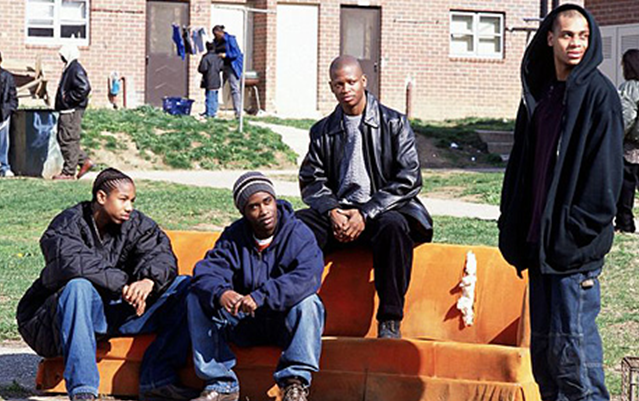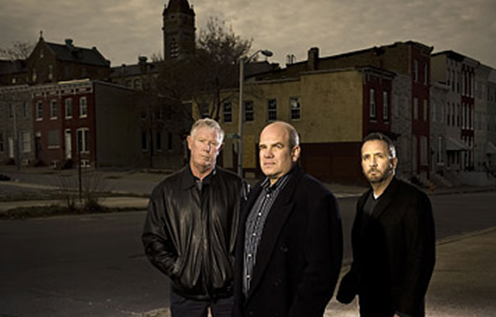On JustFocus, we often talk about series currently being broadcast. However, it seemed interesting to us to come back to the completed series in order to make you discover little jewels that you could have missed, or simply remember good memories. For this third part, we decided to tell you about The Wire , probably heralding today's successes. The Wire is an American crime drama series, released by HBO between 2002 and 2008. Composed of 60 episodes of one hour each articulated over five seasons, its main subject is crime in the city of Baltimore, through the vision of those who live it on a daily basis: police officers, traffickers of all kinds, politicians, teachers, journalists, residents of Baltimore…
"But not only!»…
… will launch fans of the series. And this is where you will understand why this little television pearl is the subject of a critical consensus, failing to have known public consecration in France. In addition to the fact that this is the first HBO creation in terms of crime series, The Wire finds its main interest in the treatment of several subjects around (not to say in parallel) the prism of crime in Baltimore. In short, the hero of the show is neither the cops nor the thugs, but the city of Baltimore itself.
Each season therefore tackles with an almost documentary elegance (since without frills or staging effects) strong themes: the daily life of the "corners" in poor neighborhoods (in the first), the decline of the commercial port and with it the universe of its dockers (second season), the tribulations and inevitable tears of the municipal team at election time (third season), the perpetual challenges of the education system, in the family and school spheres (in the fourth). The final season evokes the difficult adaptation of the writing of the city's paper newspaper to the era of finance and sensationalism. 
But what exactly is it about?
Of course, all this interpretive material is just a glimpse of what the program can contain, as it is so dense – and you will REALLY understand this sentence when you come out of an hour of episode. Do not be afraid to confront a pseudo sociological thesis, the subjects and adventures in The Wire are apprehended as normally as in Game of Thrones – some ultra fans even go so far as to describe the series as an "anti-GoT", as they can resemble each other in their rich cast and interconnected universes, but diverging on the treatment of the stories.
As a common thread and as a gateway, the series proposes to follow the ups and downs of a special unit of the Baltimore Police (a group of police officers made up of broken arms, discarded investigators …) led by a sympathetic borderline Irishman (Jimmy McNulty / Dominic West). The latter are given the objective of dealing with one of the many drug trafficking networks (the famous "corners") taking place in the poor neighborhoods of the west of the city. Like the future Game of Thrones, The Wire allows you to follow this behind the scenes of the police brigades, which was until now forbidden to us by the morality of the studios.
Thus we see on the one hand how the little hands of the neglected areas are agitated, where desperate drug addicts rub shoulders with dapped dealers and clueless kids, all governed by desperately modern kingpins (such as Russell "Stringer" Bell, played by Idriss Elba in his early days), alternating gently with the silent corridors of the places of power of the American federal state, from Police HQ to City Council (notably alongside Tommy Carcetti/ Aidan Gillen).
In short, beyond pompous adjectives and other great speeches, The Wire achieves such a work of writing that the fourth wall is broken, and that "every piece of the puzzle counts".
"The Wire is a demanding series, you have to hang on"
So spoke David Simon, one of the two showrunners of the series. For such a complex and rich project, it was necessary to at least count on experienced professionals to run this immense infernal machine. David Simon is therefore a former journalist of the Baltimore Sun, author at 27 years of a nice pavement (a manuscript of 900 pages soberly entitled Baltimore) showing the daily work of a crime squad (the famous Homicides). He is supported by Ed Burns, a former Baltimore Police officer in the same drug and narcotics squad, who has become a public school teacher.
A protean series, the title has finally inevitably inspired the authors of the successful works of recent years by daring to introduce a new rhythm, not slow but natural, in the manner of documentaries without commentary. David Simon and his team (including sociologists and urban anthropologists who immersed themselves for several days in the neighborhoods of Baltimore) follow the protagonists at their tempo and make very little use of the temporal elipse. Exit therefore the thundering and the effects of the sleeve, The Wire wants to be naturalistic and anti-spectacular by following the trial and error and the doubts, errors and blows of fate that deliver the downtime of police actions, giving more and more body to this sentence of John Lennon "Life is the thing that happens when you are busy doing something else".
Beyond the terribly accurate interpretation – HBO going so far as to subtitle some of the dialogues of the young idle of the series, the accent of Baltimore proving incomprehensible to the average American viewer! – It should also be remembered that the writing work has reached such a level of quality that several universities around the world have used the material of the series to develop teachings. Thus, two Harvard sociologists created a course aimed at illustrating the problems of urban concentration in the creation of ghettos, while the University of Paris X in Nanterre offered its sociology students a seminar on this series in 2012. At one time, the program was even Barack Obama's favorite work!
A little generic for the road?
Each memorable television object has its flagship credits. That of The Wire is no exception to the rule, and failing to mark the blow visually, it is musically that it hooks us.
Indeed, before Weeds and as a nod to the extent of the cast, each season sees different artists around the same title of Tom Waits , Way down in the hole.
Around the blues of Tom Waits himself, the gospel of the Blind Boys of Alabama, the groove of the Neville Brothers, the rock of Steve Earle, or a hip hop assemblage of young people from Baltimore (recorded specifically for the series). Thesevaried musical genres, by their personal interpretation, then resonate with one of the flagship ideas of the series, as another way of apprehending the multiple faces of the same jewel: we immediately announce the color of a choral series, where we often talk about common subjects with different tempos and geographical origins. And believe me, maybe you will not hang on to the first listen, but some of these titles are likely to follow you for a long time.
So before taking the path that will lead to the sixtieth episode of this nugget to the sound of these artists, remember one thing: "When you walk through the garden, you gotta watch your back… »
Article written by Esb440















![[Live Report] Rock En Seine 2024 : 20 ans et toujours aussi passionnés !](https://www.justfocus.fr/wp-content/uploads/2024/11/RES24_JOUR01_LANA-DEL-REY_LOUIS-COMAR-12.jpg)




















